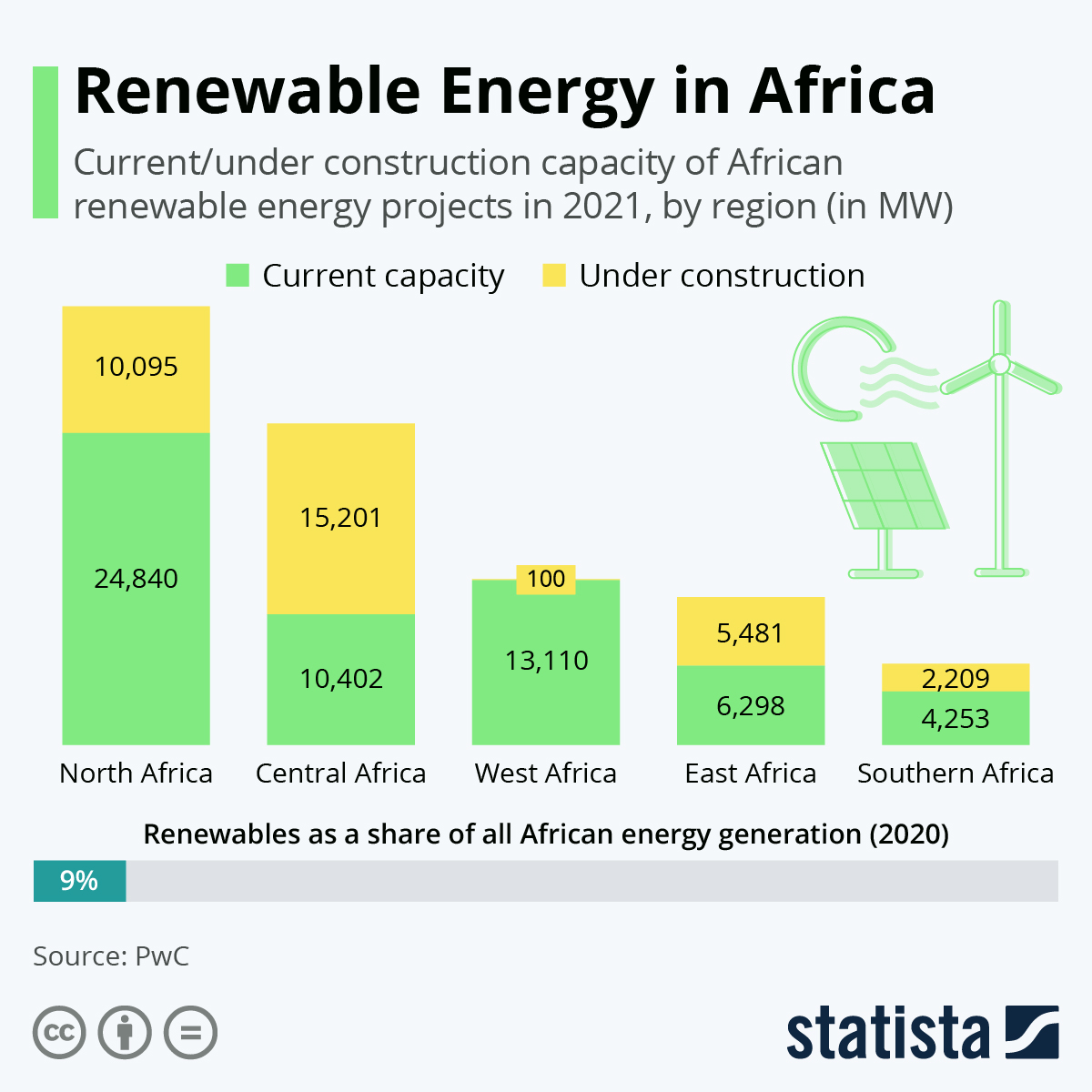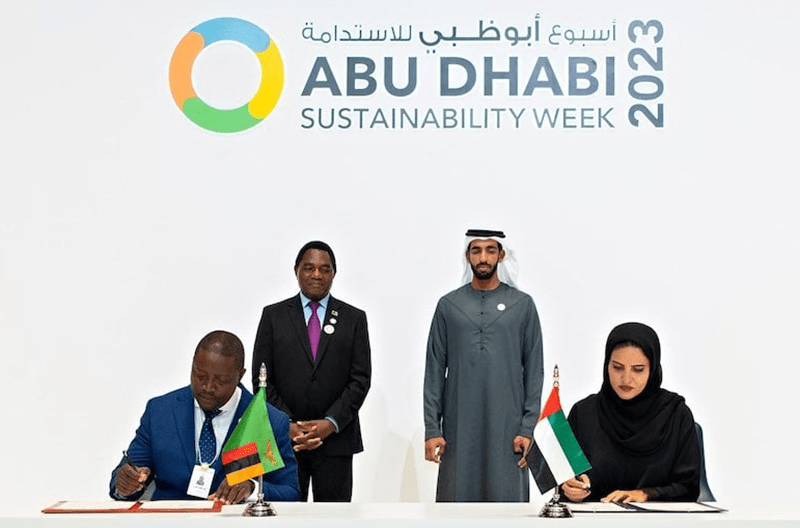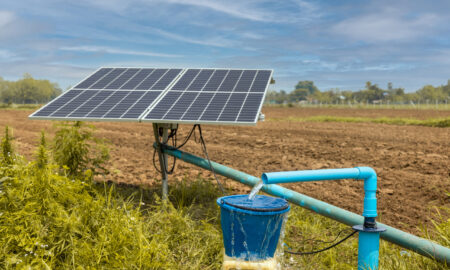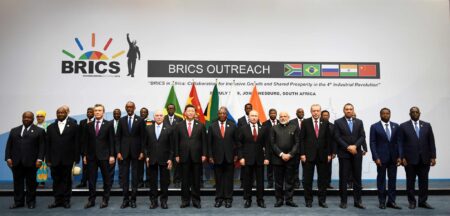- Zambia’s state-owned power utility Zesco has signed an agreement with the United Arab Emirates’ renewable energy company Masdar to develop solar projects worth US$2 billion.
- The project will commence immediately, starting with the phased installation of 500 megawatts (MW)
- Zambia has been rationing electricity supply following a big drop in water levels in Lake Kariba, threatening hydropower generation which contributes more than 75 per cent of the country’s power output.
The United Arab Emirates’ government-owned renewable energy company, Masdar, and Zambia’s state-owned energy company, ZESCO, recently signed a Memorandum of Understanding (MoU) and a Joint Development Agreement (JDA) to develop 2 GW of solar energy in Zambia. The project, which is worth US$ 2 billion, will be developed in phases over the next five years, starting with the installation of 500 MW, President Hakainde Hichilema said.
“This is not a loan but a capital injection in which the Zambian people, through Zesco, will be partners in shareholding,” he said.
“Once completed, the projects will result in an additional 2,000 megawatts of electricity in the country, within the next few years,” Hichilema added.
Zambia’s energy situation is a pressing matter, as the country’s hydropower generation has failed to meet the nation’s energy demand in recent years. This is due to the decline of rainfall caused by climate change, resulting in electricity rationing. Hydropower currently accounts for 85 per cent of Zambia’s installed electricity capacity of 2,800 MW. National access to electricity averages at 31 per cent, with 67 per cent of the urban population and 4 per cent of the rural population having access to power. The Government of Zambia (GoZ) has set a goal for universal electricity access for all Zambians by 2030.
Masdar, established in 2006, has taken a leadership role in the global clean energy sector and has helped to drive the nation’s economic diversification and climate action agenda. According to its CEO, Masdar has the right capital and resources to accelerate the deployment of renewable energy. The partnership with ZESCO is expected to bring in much needed investment and technical expertise to help Zambia to achieve its goal of universal access to electricity by 2030.
The development of clean sources of energy, such as solar, is a matter of urgency and of great importance for Zambia to diversify its energy generation portfolio. The 2 GW solar project will help to reduce the country’s dependence on hydroelectric power, which has been affected by the decline of rainfall caused by climate change.
The project, which is set to be developed in phases over the next five years, will start with the installation of 500 MW of solar energy. This will be followed by additional installations, with the goal of reaching a total of 2 GW by the end of the project. The project is expected to create jobs and stimulate economic growth in the country, as well as increasing access to electricity, particularly in rural areas.
The partnership between Masdar and ZESCO is expected to bring significant benefits to Zambia. Masdar’s experience in the clean energy sector and its access to capital and resources will help to accelerate the deployment of renewable energy in Zambia. The project will also bring much needed investment and technical expertise to the country, which will help to diversify its energy generation portfolio and increase access to electricity.
The project is expected to have a positive impact on the environment, as it will help to reduce the country’s dependence on fossil fuels and decrease carbon emissions. It will also help to improve the lives of citizens, particularly in rural areas, by increasing access to electricity.
However, the project also brings its own set of challenges. One of the main challenges is the lack of infrastructure and skilled workforce in the country, which may slow down the implementation of the project. Additionally, there may be concerns about the environmental impact of the project, as well as the potential displacement of local communities.
Read: Can solar energy aid Africa’s quest to become a global power hub?

Why is solar energy preferred as a better alternative for Zambia
There are several benefits of solar developments to Zambia, including:
- Increased access to electricity: Solar energy can provide a reliable source of electricity to rural and remote areas that are not connected to the national grid.
- Cost-effectiveness: Solar energy is often more cost-effective than traditional fossil fuels, especially in areas where there is limited access to grid electricity.
- Job creation: The installation and maintenance of solar energy systems can create jobs for local residents.
- Environmental benefits: Solar energy is a clean and renewable source of energy, which can help to reduce greenhouse gas emissions and mitigate the effects of climate change.
- Energy independence: By developing its own renewable energy sources, Zambia can reduce its dependence on imported fossil fuels and become more energy independent.
- Improved social and economic development: Access to electricity can improve quality of life, education and health, as well as enabling small businesses and industry to thrive.
Solar energy development in Zambia can bring numerous benefits not only to the country, but also to the entire Southern African Development Community (SADC) region. One of the most significant benefits is increased access to electricity. Many rural and remote areas in Zambia are not connected to the national grid and solar energy can provide a reliable source of electricity for these communities.
Furthermore, solar energy is often more cost-effective than traditional fossil fuels, especially in areas where there is limited access to grid electricity. This can help to reduce energy costs for the entire SADC region. The installation and maintenance of solar energy systems also creates job opportunities for local residents, which can help to improve economic development.
Solar energy is also a clean and renewable source of energy, which can help to reduce greenhouse gas emissions and mitigate the effects of climate change for the entire SADC region. By developing its own renewable energy sources, Zambia can reduce its dependence on imported fossil fuels and become more energy independent. This can also help to increase energy security for the entire SADC region.
The integration of Zambia’s solar energy systems into the regional power grid can increase the reliability and stability of the grid, making it more resilient to disruptions. This can help to improve regional power grid and increase cross-border trade and cooperation in the energy sector.











